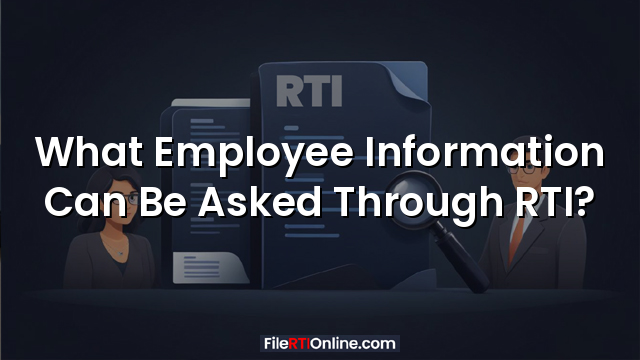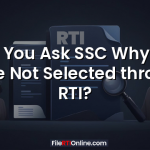The Right to Information (RTI) Act, 2005 empowers every citizen to access information held authorities. One of the most common queries filed under RTI is related to details of employees working in government departments or public sector undertakings.
But where is the line drawn? Which employee information must be disclosed, and which one is protected under privacy exemptions?
Using a real case decided Central Information Commission (CIC) regarding BSNL employee information, this article explains exactly what details can be obtained and what cannot.
Why People Seek Employee Information Through RTI
People file RTIs about government employees for many reasons:
- Doubts about irregular appointments
- Verification of qualifications or posting history
- Suspected corruption or misuse of authority
- Salary-related comparison
- Transparency in public recruitment
While RTI promotes transparency, it also protects personal privacy. The challenge is balancing both.
What Information About Employees Must Be Disclosed
Under Section 4(1)(b) of the RTI Act, every public authority is required to proactively disclose several categories of information. This includes many employee-related details.
Based on the BSNL case example, the following information must be provided:
1. Date of Appointment
Appointment dates are part of an employee’s official service record and fall under mandatory disclosure.
2. Posting / Transfer Details
Where the employee is posted, transferred, or assigned duties is not personal information.
3. Designation, Role, and Duties
These are part of the public authority’s structure and must be disclosed.
4. Monthly Salary / Remuneration
Under Section 4(1)(b)(x), public authorities must publish the monthly remuneration of all officers and employees.
5. Organisation Chart & Hierarchy
Information about roles, reporting structure, and accountability is public.
6. Records, Rules, Manuals Used
These must be disclosed under Section 4(1)(b)(v).
Conclusion:
Any service-related information that affects public functioning or accountability must be shared.
What Employee Information Cannot Be Disclosed
The CIC has consistently held that certain information is personal and protected under Section 8(1)(j), unless larger public interest is shown.
In the BSNL case, the following information was correctly denied:
1. Loan Details Taken Employee
Home loans, education loans, personal loans etc. are private financial details.
2. Appointment Letter Copy
This may contain personal details such as address, family info, and identification numbers.
3. Personal Financial Documents
Bank statements, PF loan details, insurance loans, etc.
4. Family-related Information
Children’s education, spouse details, and medical information.
These cannot be disclosed because:
- They have no public activity or public interest connection.
- Disclosure would cause unwarranted invasion of privacy.
- No larger public interest was demonstrated appellant.
Case Example: BSNL Employee Appointment Information
Background
An applicant filed an RTI with BSNL seeking:
- Date of appointment
- Appointment letter copy
- Salary details
- Loan documents taken employee
The Public Information Officer (PIO) denied disclosure claiming third-party information.
CIC Proceedings
The Commission reminded the PIO that as per Section 4(1)(b), several employee-related details must be proactively published.
The PIO admitted that:
- Date of appointment
- Posting details
- Monthly remuneration
can be given.
He argued that the loan details are private.
Final Decision
The CIC ordered the PIO to provide all permissible information and upheld the denial of personal financial details under Section 8(1)(j).
What Employees Information You Can Ask in RTI (Safe List)
You can safely ask for:
- Date of joining
- Employee code / designation
- Duty chart and responsibilities
- Transfer and posting history
- Salary details
- Leave rules and service rules
- Records used
- Number of employees in a section
- Vacancy details
- Attendance registers (unless personal privacy is affected)
This is routinely allowed in most CIC decisions.
What You Should Avoid Asking (Restricted List)
The following usually get rejected:
- Loan details
- Bank information
- PAN, Aadhaar, or ID proofs
- Medical records
- Family details
- Home address
- Educational loan documents
- Personal disciplinary complaints (unless proven public interest)
Key Takeaway
The RTI Act allows you to obtain official, service-related, transparent information about public employees. But personal and financial information is protected unless a clear public interest is proven.
The BSNL case clearly shows the boundary:
- Service details = Allowed
- Personal details = Not allowed
If you frame your RTI correctly only official information, you will get faster and complete replies.

